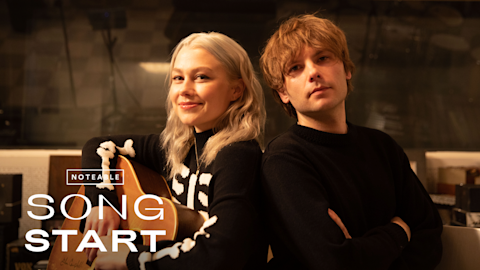The solo artist and songwriter for the likes of Lady Antebellum shares tips for realizing your dreams in Music City.
Nashville is a distinctive city no matter your interests, but if you’re a musician it’s truly one of a kind. Aspiring next-big-things flock here from all over the world, chasing dreams of becoming a songwriter or a star (or both). It’s the home of Music Row, the Grand Ole Opry, and the Ryman Auditorium, also known as “The Mother Church of Country Music.” On any given day you can walk down Lower Broadway and hear world-class tunes spill out of every bar, or head to a dive in East Nashville to see the best guitar-slingers you’ve never heard of. It’s been exhaustively mythologized in the history of American music, placed in the same category as other make-or-break destinations like Los Angeles and New York. Succeeding here is no easy feat, but songwriter and now solo artist Caitlyn Smith has managed to do just that.
A native of Cannon Falls, MN (pop. 4,083), Smith has helped pen a platinum pop hit for Meghan Trainor; the driving country-rock title track of Lady Antebellum’s 747; and tunes for the hit TV drama Nashville. After years of doing the behind-the-scenes work, and craving a return to performing her own work, she released her major-label debut, Starfire, in January. The record unleashes the skills Smith honed over the years at churches and county fairs, on empty, dusty honky-tonk stages, and in writing rooms. She delivers soulful pop melodies with heart-stopping vocals and an air of authenticity you can only achieve by living your songs. With her stellar resumé, flooring debut, and a tour with Sheryl Crow coming up, Smith is in the driver’s seat of her career. But as one of Starfire’s best cuts, “This Town Is Killing Me,” illustrates, she walked a long road of rejection to get there, starting with one of her very first meetings in Nashville as a teenager.
“It went horribly, and they were like, 'Thanks kid, better luck next time!',” Smith says over the phone, on vacation in Brainerd, MN. “I remember sitting on the curb on my guitar case, waiting for my ride to pick me up, and it starts raining, and I start crying, like, 'This is not how it's supposed to go!' There are a million stories like that, of just being dragged along by labels to never be called back again. But looking back, it was all part of the journey, and I'm grateful for every 'No,' because it brought me to make this record, and it brought me to be the artist I am today.”
One of the first steps in any Nashville songwriter’s journey is securing a publishing deal, and Smith recalls that she knocked on a lot of publishers’ doors over the years. She estimates there were around 30 “back in the day.” But every meeting represented a chance to play her songs and make connections, which was crucial for when she finally landed a showcase and invited everyone whose office she’d visited. She ended up with four offers on the table. “Which was crazy,” she notes. “From what I've heard, that isn't always the case.”
Since landing a staff songwriter gig, Smith’s day-to-day life looks something like this: She rolls into the office at 10 or 11 a.m. On any given day, she could be writing with an artist, another writer she’s got a rapport with, or a total stranger. If she’s writing a country song, the publishing company will often have what’s called a pitch sheet—a document that says who’s recording soon and what they need.
“You're getting in a room and saying, 'Okay, Lady Antebellum is going into the studio in two months, they're looking for an uptempo song that's not about love. What can we write about today?',” Smith says. “Then you're given some sort of fodder to start with. But some days you go in the room and say, 'I'm just gonna make something up and see what happens.' Other days you're in specifically with the artist so you're trying to draw out what they need from their record, what they're trying to say. It turns into a therapy session a lot of times with the artist,” she adds with a laugh.
She points out that the exciting thing about Nashville right now is how much it’s jettisoned traditional notions of genre, which has allowed her to collaborate with artists outside country and expand her writing skills. Starfire is a testament to that—it touches on pop, soul, folk, rock, and, yes, country. It also allowed Smith to learn how best to write for herself, too, which sounds like it’d be a given, but when you’re spending your days writing for other artists, it takes work to rediscover what it’s like to write in your own voice.
“You're putting on different hats, playing different characters, trying to chase the emotion or the groove,” Smith says. “But writing for myself, it was more digging around in my own heart and my own story, and trying to put that out there.”
Smith has some good advice for young songwriters looking to make it in Nashville: Rejection will happen, so when it does, pick yourself up and keep working; having chemistry with another writer is akin to having it with any other person—if you wanna be friends and hang out, you can likely write a great song together; no one knows for sure if they’ve got a hit the moment after it’s written; and get out of your comfort zone. Her best advice, though, comes from a realization she had years ago, after exhausting herself and becoming unhappy by trying to write the songs she thought everyone wanted to hear.
“The thing I wish I would've known is to figure out what I do best, and do that 100%,” she says. “Don't try to chase after what the dude next to me is doing, don't try to chase after the radio. Because there are no other songwriters out there like you, specifically. So own what you do best—if you crush a weird lyric, then you should continue to write weird lyrics! Don't change that. Or if your melodies are bizarre and jazzy, keep doing that. Because someday there's gonna be an artist that comes along that fits that exactly. So, don't try to morph yourself into what the industry is doing. Just do you.”
— Matt Williams
Popular Stories
video
How Julia Wolf Made It




